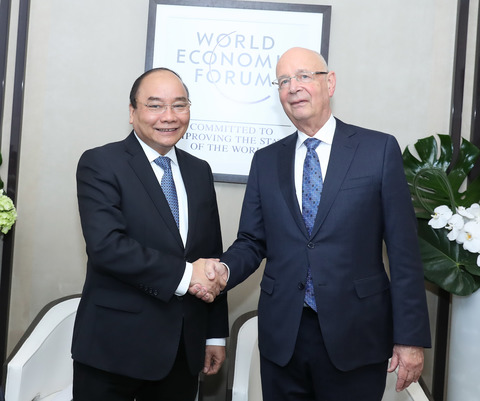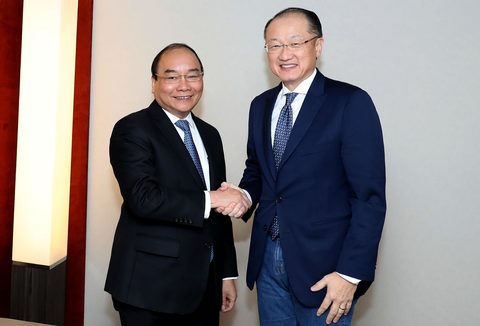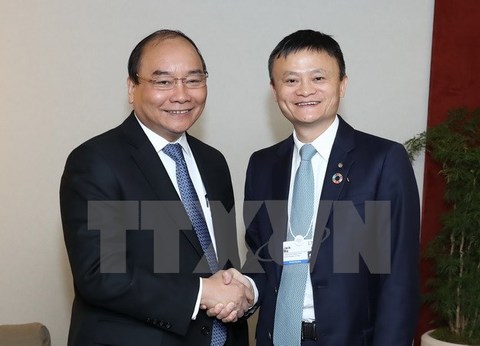
Prime Minister Nguyen Xuan Phuc (left) meets with World Economic Forum (WEF) Founder and Executive Chairman Klaus Schwab in Davos, Switzerland on Wednesday. — VNA/VNS Photo Thong Nhat
Viet Nam will focus on developing human resources, science and technology in a bid to keep pace with the fourth industrial revolution, Prime Minister Nguyen Xuan Phuc said yesterday at a debate in Davos, Switzerland about the future of production.
At the session, which forms part the 47th World Economic Forum (WEF) Annual Meeting, he noted that Viet Nam can no longer count on exhausting natural resources and cheap labour to achieve a fast and sustainable growth in the new era.
He briefed participants at the prestigious summit of the world’s political, economic and business leaders about Viet Nam’s renewed growth model that emphasises improved growth quality, labour productivity and economic competitiveness, as well as the development of sectors with high added value, scientific and technological applications and a highly skilled workforce.
He affirmed that businesses are positioned as the centre of Viet Nam’s renovation course and pledged to create a fair and favourable business environment.
Up to 110,000 new businesses were set up in 2016, he said, reporting on the country’s 2020 goal of having over 1 million new enterprises and assisting 600 businesses with 2,000 creative start-up projects in order to help them access novel technologies. In addition, he said, Viet Nam will speed up international integration in order to nurture renovation and creativity.
Focus on IT
PM Phuc also had a candid dialogue with the chief executive officers of leading IT groups, on the margins of the WEF.
He said information technology is booming in Viet Nam, especially in industry, agriculture, transport, healthcare and education. In fact, he added, Viet Nam has been one of the highest growth information technology and telecom markets in the world over the past decade.
Nearly 60 per cent of the country’s population under the age of 35 are able to access new technologies, while over half of the population is using the internet, he noted.
Last year, Viet Nam exported over US$55 billion worth of mobile phones, computers, cameras, and accessories. The country was also listed among the top 10 software outsourcing providers in the Asia Pacific region and among the top 30 in the world.
By 2020, Viet Nam strives to rank among the top 10 suppliers of software outsourcing and digital content in the world, with around one million workers in the field of information and technology, the PM said.
Viet Nam is due to host the Asia-Pacific Economic Co-operation (APEC) Summit in 2017 under the theme “Creating a new driving force for a common future”, he said, noting that promoting information technology innovations will be one of the most important forces to enhance competitiveness in the digital era.
Whether the Trans-Pacific Partnership agreement is approved or not, Viet Nam still has dozens of trade agreements, including an FTA with the European Union, and other relevant pacts, he said.
Viet Nam has continuously pursued its policy of trade liberalisation and customs reform, particularly the application of e-customs, he said, adding that the Southeast Asian country is one of the few nations in Asia to grant e-visas to foreign tourists.
 Prime Minister Nguyen Xuan Phuc (left) meets with World Bank (WB) President Jim Yong Kim in Davos. — VNA/VNS Photo Thong NhatVN-WEF partnership
Prime Minister Nguyen Xuan Phuc (left) meets with World Bank (WB) President Jim Yong Kim in Davos. — VNA/VNS Photo Thong NhatVN-WEF partnership
Viet Nam and the World Economic Forum (WEF) have signed a partnership agreement to support the country’s economic development as the fourth industrial revolution unfolds.
“Viet Nam has recorded tremendous success in reaching middle-income status in just a few decades and we look forward to helping the country navigate the new global context so that it is able to raise growth and living standards even further,” WEF Founder and Executive Chairman Klaus Schwab said at the signing ceremony on Wednesday afternoon during the WEF meeting.
Under the agreement, the Forum will work with Viet Nam to assess the country’s preparedness for the transformation of the fourth industrial revolution.
The agreement will bring together the Forum’s ongoing initiatives in Viet Nam, which cover areas such as food security, trade, infrastructure and the future of manufacturing, and launch new ones.
The work will focus on the Forum’s capacity to convene expertise on issues related to the fourth industrial revolution and to understand what impact this will have on issues such as development models, industrial structures, and the inclusiveness of growth.
WEF will connect Viet Nam with a network of leading businesses and experts and also help the country improve its human resource capability by receiving Vietnamese officials for internship programmes at WEF bodies.
Speaking at the ceremony, Prime Minister Nguyen Xuan Phuc said he hopes the co-operation with WEF “will contribute to ‘future-proofing’ our economy and ensuring that our citizens continue to benefit from out development journey.”
Earlier, in his talks with Schwab, Phuc had asked WEF to continue organising its forum on the Mekong Region, a Vietnamese initiative which was held for the first time last October.
He also expressed his hope that WEF will provide the country with policy consultations on hi-tech agricultural development and improving national competitive capability.

Prime Minister Nguyen Xuan Phuc (left) meets with Alibaba Group Founder and Executive Chairman Jack Ma in Davos. — VNA/VNS Photo Thong Nhat
Bilateral talks
The PM engaged in various activities on the sidelines of the WEF annual meeting over the last two days in Davos.
In his meeting with World Bank (WB) President Jim Yong Kim yesterday, PM Phuc said that Viet Nam appreciated WB’s role and its contribution to the socio-economic development of the Southeast Asian nation.
He also extended to President Kim an invitation to attend the APEC Summit to be hosted by Viet Nam this year, which Kim gladly accepted.
Phuc asked the World Trade Organisation (WTO) to support Viet Nam in the implementation process of the WTO pacts, trade negotiations and dispute settlements as he met with WTO Director-General, Roberto Aze-vedo.
Alibaba Group Founder and Executive Chairman Jack Ma, meanwhile, told PM Phuc in their meeting that his group was developing a co-operation plan with Viet Nam with a focus on digital technology.
In his talk with Austrian Prime Minister Christian Kern on Wednesday, the two leaders agreed that bilateral relations had seen positive developments. They agreed to convene a meeting of the Intergovernmental Committee on Economic and Trade co-operation and organise activities to celebrate the 45th anniversary of diplomatic relations in 2017.
At a meeting between the Vietnamese leader with President of Asia Development Bank (ADB) Takehiko Nakao, the two sides agreed to implement various projects on infrastructure development, climate change response, economic restructuring, and poverty reduction.
PM Phuc asked ADB to continue supporting Viet Nam in transport infrastructure development, energy, administrative procedure simplification, and trade and investment facilitation in the Greater Mekong Sub-region (GMS).
He invited the ADB President and other leaders to attend the APEC forum High-Level Week in the central city of Da Nang and related meetings later this year in Viet Nam.
In response, Nakao pledged to extend preferential credit for Viet Nam until 2019 and help the country launch projects within the framework of GMS co-operation.
At a meeting with the President of Microsoft Corporation, Brad Smith, PM Phuc asked the corporation to continue its investment in Viet Nam while also supporting the country in high-tech transfers. Smith said the corporation wants to intensify co-operation with Viet Nam in cyber security, human resource training and software industry development. — VNS